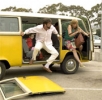Little Miss Sunshine
You know the drill. A bunch of kooky characters are forced together by a set of contrived circumstances. Through hilarious misadventures, they all learn something more about themselves, and they all live happily ever after.
In a way, Little Miss Sunshine is just another one of those kooky comedies. Except, of course, that it’s awesome in every way. Perhaps every cliche is just a good idea waiting for someone to come along and kick it up the arse. I can imagine an awful version of Little Miss Sunshine, probably starring Rob Schneider, but luckily we didn’t get it.
Have you heard the one about the suicidal gay Proust scholar, the neurotic writer of painfully lame self-help books, the moody teen who’s taken a vow of silence, the reasonably normal mother,1 and the sex-obsessed grandfather? Oh yes, and the cute kid who wants to win a beauty contest. And the unreliable van. That’s the film right there, really — just mix those ingredients, cook for 100 minutes, and serve, being sure to omit any cliched speeches about how it’s better to be yourself, or to accept life for what it is, or to not use drugs. There’s no over-sentimentality in Little Miss Sunshine, no soppiness, no cheese. There’s no room; it’s filled with honest emotions and huge laughs.
The direction is elegant and restrained, pulling back from most of the action, and making you feel like you’re just on the trip with the characters. None of the actors put a foot wrong, but it’s Steve Carrell2 who’s the biggest revelation here. In the hands of a lesser actor, a suicidal gay Proust scholar could have been a godawful camp cliche. Steve Carrell almost makes him the key identification figure. Paul Dano does a pretty impressive job too, given that he’s not allowed to talk at all.
And, in the centre of it all, it’s hard not to love Olive (Abigail Breslin). Where does someone get such good comic timing from at such a young age?3 In fact it’s hard not to love the whole film. I’m certainly not going to try.4
- I mean, she has her odd moments but she hasn’t got any key characteristics you can sum up in a sentence like that. Why are the sensible characters always girls? Sexism or verisimilitude? Guess what was word of the day on my desk calendar? Actually I have no words or desks but you can’t just drop a word like that without commenting. ↩
- Of The 40 Year Old Virgin fame, but originally of course from The Daily Show, just before I started watching it. O cruel fate. ↩
- Ebay? ↩
- I hate finishing a review saying “See this film”. Seems like an awful cliche. But I equally hate leaving you in any doubt that you should. So let’s just take it as read that you will. ↩



andy
October 25th, 2006 at 10:17 pm
I felt sorry for Paul Dano’s character. I was hoping at least he would get a happy resolution, even if no one else did. Nothing cheesy, maybe just an ‘oh all of a sudden he’s only a bit colour blind’ kind of thing.
I like the pic from the poster.
Jack
October 26th, 2006 at 12:28 am
Not wanting to take anything away from Steve Carell, because I loved him in this – I feel like the writers deserve some credit for the character not being a “camp cliche”. In the film, the fact that Frank is gay is irrelevant, and I find it refreshing to watch a film where a character just happens to be gay, and for the film not to make an issue out of it. If we are going to pat anyone on the back for breaking down stereotypes, surely it should be the authors. I don’t think Carell’s performance was any better than the rest of the cast. Although that being said, everyone was excellent.
I can’t imagine Rob Schneider being anything but camp however. Thank god he wasn’t cast.
andy
October 26th, 2006 at 1:58 am
The writers got plenty of credit in the credits. I think the Key Grips did a wonderful job.
Jack
October 26th, 2006 at 2:10 am
Define plenty. Bigger font? Names repeated for the same job? You don’t even know what a key grip does. And don’t say he grips the key.
Tom
October 26th, 2006 at 2:24 am
I’d disagree that Frank being gay is “irrelevant”. There’s at least three jokes about it for a start. Also, when I imagine his love triangle as involving a young female student and him being straight, it just doesn’t seem quite as tragic. Not sure why though so don’t go after that.
I suppose it’s a conceit of reviewing to give the credit for acting decisions to the actors when it’s quite plausible that decisions were made all the way down the process. There’s a line of Frank’s: “No one gets left behind! No one gets left behind! Outstanding soldier! Outstanding!” that I reckon would be quite open to a more stereotyped interpretation, for one. Ultimately I was thinking more about avoiding stereotyped mannerisms and body language which I doubt is in the script either way (but could be).
Though, Frank does run in a silly way.
Carell’s character made me care about him more than most of them did — not that all of them weren’t great, but I really felt like Carell did an awesome job of playing someone with peculiar and disturbing problems like a normal person. Of course, presumably you can do that by just acting normal, so perhaps I am giving him too much credit.
On another point, I forgot that the Grandpa was Yossarian from Catch 22 while watching, unfortunately.
Jack
October 26th, 2006 at 8:11 am
I just meant it’s not really relavent the plot or any of the themes. Making a joke about doesn’t really make it important any more than mentioning it does. The fact he is gay is probably less pertinent than the fact he is a Proust Scholar.
I didn’t mean for you to defend your position. You are entitled to think Carell is awesome. I just didn’t think he was. I was more hoping for general agreement about how it’s nice to have a gay person in a film that isn’t an archetype. Yay!
Tom
October 26th, 2006 at 9:40 am
Are you kidding? I’ve had it up to here with gay Proust scholars. What a cliche. No, no, I quite agree.
It’s not strongly relevant to the plot or themes that he’s gay, or at least not essential to them, but you were saying that the script should get all the credit for the character not being an archetype and I don’t think that’s the case. As I pointed out, the writer had a gay character say “soldier”. That’s risky, that is. It seems quite likely that Carell and/or the director had a big say in how Frank ended up on screen.
Jack
October 26th, 2006 at 6:13 pm
Of course. I agree. I wasn’t trying to take everything from the actors – obviously they do a lot to shape the characters. I never said I wanted the writers to have all the credit. Just some.
The soldier line is risky. His funny walk is extremely funny. Although I should point out that you you don’t have to be guy to have a silly looking walk. Just look at Matt.
ben
October 29th, 2006 at 12:22 am
This is what the job of a (Key) Grip is